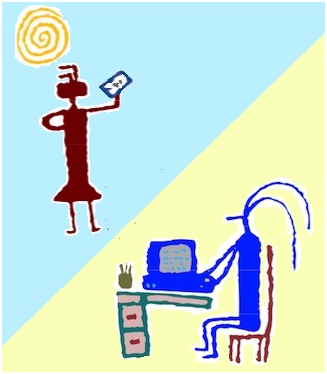
When I began writing about online culture, back in the late 1990s, misinformation was at a minimum and easy to identify, and hateful trolls were oh-so-quickly banned from the online communities they tried to disrupt.
Now, hate and misinformation rage online, and not just among strangers – neighbors are raging against each other on local online communities.
Back in the 1990s, in promoting virtual volunteering – using the Internet to support and involve volunteers – people who were new to the Internet (yes, there used to be such people) would ask lots of questions about what it is like to work with people remotely, rather than onsite, in-person. I created a section of the Virtual Volunteering Project web site, and then my own web site, specifically to talk about online culture, about the different ways people expressed themselves online and how to appreciate those differences, and how to quickly ramp up your skills for working with others online. I linked to some netiquette guidelines, but didn’t put much emphasis at all on online civility, dealing with trolls or addressing misinformation.
My, how times have changed…
A recent Wall Street Journal investigation revealed that Facebook was aware of its Facebook groups feature’s polarizing tendencies as early as 2016, and the Facebook groups feature continues to serve as a vector for lies, especially regarding COVID-19, as this Wired article, Facebook Groups Are Destroying America, notes:
Facebook users have been seeing more content from “friends and family” and less from brands and media outlets… Dynamics in groups often mirror those of peer-to-peer messaging apps: People share, spread, and receive information directly to and from their closest contacts, whom they typically see as reliable sources. To make things easier for those looking to stoke political division, groups provide a menu of potential targets organized by issue and even location; bad actors can create fake profiles or personas tailored to the interests of the audiences they intend to infiltrate. This allows them to seed their own content in a group and also to repurpose its content for use on other platforms... Related memes and links to fringe right-wing websites have been shared millions of times on Facebook in the past few months. Users coordinating their activities across networks of groups and pages managed by a small handful of people boost these narratives. At least nine coordinated pages and two groups—with more than 3 million likes and 71,000 members, respectively—are set up to drive traffic to five “news” websites that promote right-wing clickbait and conspiracy theories. In May, those five websites published more than 50 posts promoting Obamagate, which were then shared in the linked pro-Trump groups and pages. The revolving door of disinformation continues to spin.
And that doesn’t even begin to address the problems with dedicated trolls – people who target others online with insults and harassment in an effort to drive the person offline.
I now have a curated list of resources on online civility, and I continue to update my long list of recommendations on how to address online misinformation, which I’ve been maintaining for more than two decades. I also now have a web page of resources regarding online harassment, defamation & libel, and I regularly share on the TechSoup Online Community about how women worldwide are the frequent targets of harassing trolls who dedicate their time to silencing those voices. I never dreamed back in the 1990s things would be so overwhelmingly negative now and these would be the highly critical issues that they are. But, here we are.
Can online civility be restored? Is it possible to challenge misinformation and destructive speech in the strongest, most deliberate of terms without being accused of hate speech yourself? Can there be rules for online civility that don’t stifle much-needed debate? I hope these curated resources can help answer those questions – but, honestly, based on what I’ve experienced myself this year, I’m deeply skeptical. Perhaps I need to create a list of resources on “Learning to live and thrive in a world with hateful, hate-filled people.”
Also see:
- Support Your Local Online Discussion Manager!
- Resources regarding online harassment, defamation, libel & cyberstalking.
- Haters gonna hate.
- Contributing to online communities can help you professionally

Also, the Last Virtual Volunteering Guidebook: Fully Integrating Online Service Into Volunteer Involvement can help you better work with people online – specifically volunteers. These can be volunteers in short-term, “microvolunteering” tasks or longer-term, more high-responsibility roles. These can be volunteers who do some or most of their service onsite, at your organization or volunteers who do most or all of their service remotely, rarely or ever onsite and in-person with you. This is the most comprehensive resource anywhere on working with online volunteers, and on using the Internet to support ALL volunteers, including those you might not think of as “online” volunteers.

If you have benefited from this blog or other parts of my web site and would like to support the time that went into researching information, developing material, preparing articles, updating pages, etc. (I receive no funding for this work), here is how you can help.
